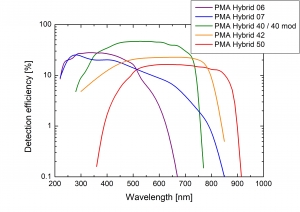Photon Counting Detectors
PMA Hybrid Series
Hybrid Photomultiplier Detector Assembly
- Timing resolution down to < 50 ps (FWHM, cathode dependent)
- Detection efficiency up to 45 % (cathode dependent)
- Negligible afterpulsing
- Shutter and overload protection
- Active sensor area: 3, 5, or 6 mm (cathode dependent)
- Internal HV power supply and pre-amplifier
- Active temperature stabilization
The PMA Hybrid is a compact, single photon sensitive detector based on a fast hybrid photomultiplier tube (R10467 from Hamamatsu) with Peltier cooler to reduce the dark count rate. It features two signal outputs: a negative voltage pulse for timing and counting applications and an analog positive output voltage proportional to the count rate that can be connected to e.g. A/D converters. The detector assembly includes a high voltage power supply, a pre-amplifier with overload protection, and an emergency shut down procedure if the detector count rate reaches a critical limit.
Housing with dedicated RF shielding
The PMA Hybrid is encased in a nickel coated aluminum housing to achieve high level of RF shielding and protection against interference from other devices. The built-in pre-amplifier is specially optimized for timing sensitive applications such as Time-Correlated Single Photon Counting (TCSPC). The output signal of the PMA Hybrid can be accessed through a standard 50 Ohms SMA connector.
Spectral ranges between 220 nm and 890 nm
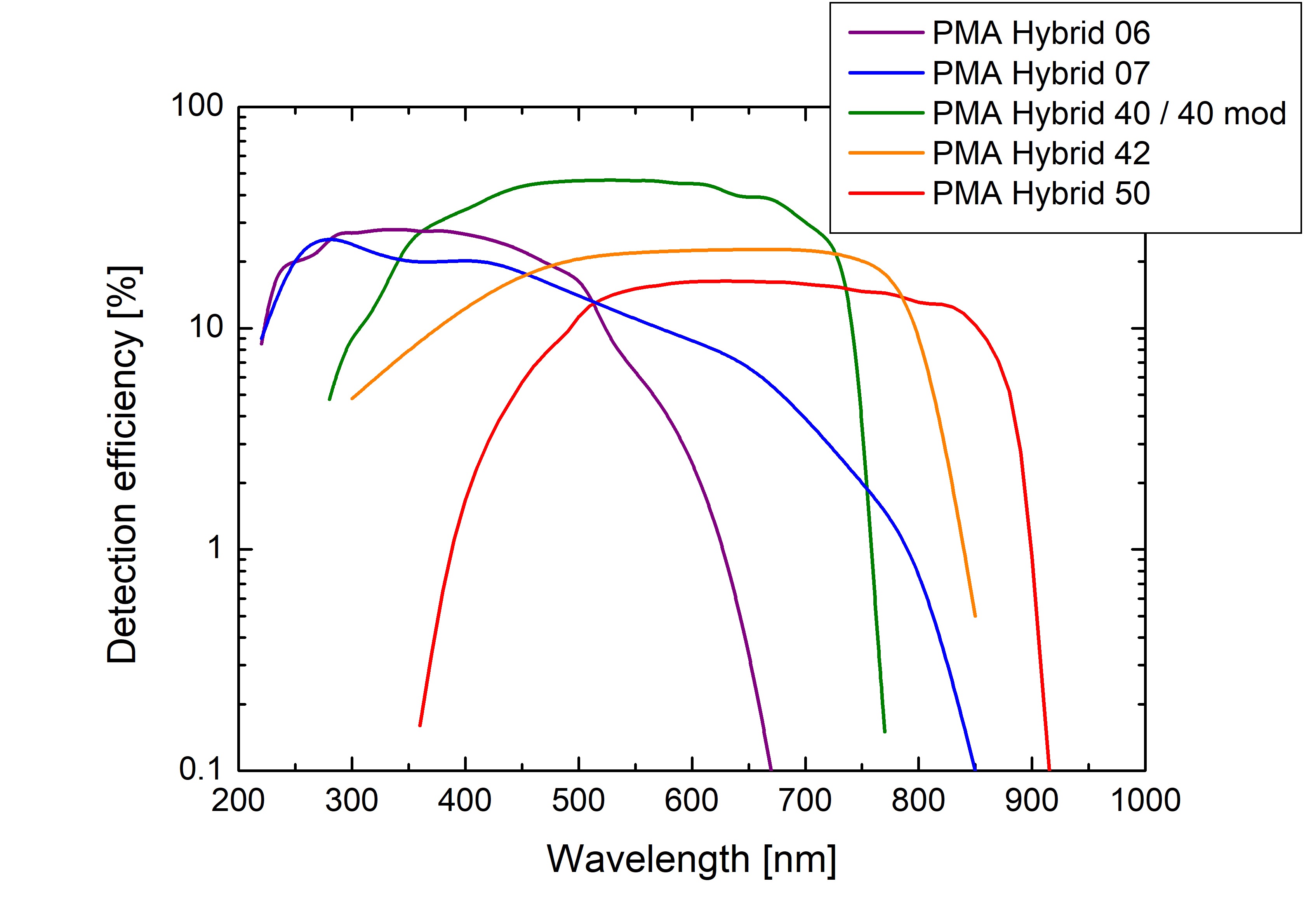 Five different photocathodes can be incorporated into the PMA Hybrid to meet the user's needs. The PMA Hybrid 06 and 07 are sensitive in the UV and in the blue spectral region. High detection efficiencies in the visible spectrum (up to 45 % at 500 nm) are achieved with the PMA Hybrid 40. For applications using light at longer wavelengths of the visible spectrum and in the NIR, the PMA Hybrid 42 and 50 are the best choices.
Five different photocathodes can be incorporated into the PMA Hybrid to meet the user's needs. The PMA Hybrid 06 and 07 are sensitive in the UV and in the blue spectral region. High detection efficiencies in the visible spectrum (up to 45 % at 500 nm) are achieved with the PMA Hybrid 40. For applications using light at longer wavelengths of the visible spectrum and in the NIR, the PMA Hybrid 42 and 50 are the best choices.
Timing down to 50 ps, negligible afterpulsing
All PMA Hybrid detectors have a very good timing resolution that can even reach values down to 50 ps (FWHM) for the blue sensitive version. In contrast to other detector types, afterpulsing is negligible. This special features makes the PMA Hybrid especially suited for e.g., Fluorescence Correlation Spectroscopy (FCS), where the afterpulsing peak at early lag times often complicates the analysis of the autocorrelation function.
Large active area of several mm
The PMA Hybrid interfaces directly with all PicoQuant TCSPC products such as the TimeHarp 260, PicoHarp 330 or HydraHarp 500. Due to its large active area of up to 6 mm, the detector can be connected to spectrometers such as the FluoTime 250 or FluoTime 300. It can also be attached to Laser Scanning Microscopes in Non-Descanned Detection (NDD) setups via the C-mount adapter. Integration in descanned detection mode or other systems, such as the confocal time-resolved microscope MicroTime 200 is also possible.
| Electrical Parameters | ||||||
|---|---|---|---|---|---|---|
| Cathode type | -06 | -07 | -40 | -40 mod | -42 | -50 |
| Wavelength range | 220 nm - 650 nm |
220 nm - 850 nm |
300 nm - 720 nm |
300 nm - 720 nm |
300 nm - 870 nm |
380 nm - 890 nm |
| Dark counts (cooled)* | typ. 10 cps, max. 20 cps |
typ. 100 cps, max. 250 cps |
typ. 100 cps, max. 300 cps |
typ. 300 cps, max. 1000 cps |
typ. 150 cps, max. 320 cps |
typ. 250 cps, max. 600 cps |
| Transit time spread (FWHM, typ. value) | < 50 ps | < 50 ps | < 120 ps | < 120 ps | < 130 ps | < 160 ps |
| Overload shutdown at | 80 MHz (with CW excitation, lower values at different conditions) | |||||
| Single electron response width (typ. value) | 600 ps | |||||
| Pulse rise/fall time (typ. value) | 400 ps | |||||
| Signal Output (Timing) | ||||||
| Connector | SMA female | |||||
| Impedance | 50 Ohms | |||||
| Polarity | negative | |||||
| Signal Output (Analog) | ||||||
| Connector | SMA female | |||||
| Impedance | > 1000 Ohms | |||||
| Polarity | positive | |||||
| Max. output voltage | +10 V (corresponds to 50 Mcps) | |||||
| Time constant of the amplifier | 20 µs | |||||
| Power Supply | ||||||
| Input | 12 V DC | |||||
| Max. current consumption | 0.8 A | |||||
| General | ||||||
| Detector area diameter | 6 mm | 6 mm | 3 mm | 5 mm | 3 mm | 3 mm |
| Housing (w × d × h) | 60 mm × 175.3 mm × 114.5 mm | |||||
| Optical adapters | C-mount, 4 mounting holes | |||||
* If lower dark counts than those specified here for the detector of your interest are necessary, we can offer you a special selection upon request.
Typical detection efficiency vs. wavelength
All Information given here is reliable to our best knowledge. However, no responsibility is assumed for possible inaccuracies or omissions. Specifications and external appearances are subject to change without notice.
Instrument Response Function (IRF)
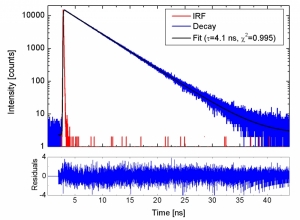 The plot shows the fluorescence decay of an anthracene solution in ethanol acquired using the FluoTime 300 fluorescence spectrometer. The sample was excited with a picosecond pulsed diode laser at 375 nm (LDH-D-C-375) at a repetition rate of 10 MHz. A single exponential decay model with a lifetime of 4.1 ns fits the decay very well, proven by the weighted residuals. Note the short, clean response of the detector revealed by the IRF. Analysis performed by FluoFit (replaced by EasyTau 2).
The plot shows the fluorescence decay of an anthracene solution in ethanol acquired using the FluoTime 300 fluorescence spectrometer. The sample was excited with a picosecond pulsed diode laser at 375 nm (LDH-D-C-375) at a repetition rate of 10 MHz. A single exponential decay model with a lifetime of 4.1 ns fits the decay very well, proven by the weighted residuals. Note the short, clean response of the detector revealed by the IRF. Analysis performed by FluoFit (replaced by EasyTau 2).
Fluorescence Correlation Spectroscopy (FCS)
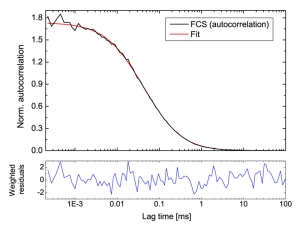 The plot shows the FCS (autocorrelation) curve of a of a 1 nm ATTO 488 solution acquired with the MicroTime 200 time-resolved confocal microscope. The sample was excited with a picosecond pulsed diode laser at 485 nm (LDH-D-C-485). The correlation curve is free from the typical afterpulsing peak at early lag times and proves the clean response of the detector. Analysis performed by SymPhoTime 64.
The plot shows the FCS (autocorrelation) curve of a of a 1 nm ATTO 488 solution acquired with the MicroTime 200 time-resolved confocal microscope. The sample was excited with a picosecond pulsed diode laser at 485 nm (LDH-D-C-485). The correlation curve is free from the typical afterpulsing peak at early lag times and proves the clean response of the detector. Analysis performed by SymPhoTime 64.
The single photon sensitive detectors of the PMA Hybrid Series can be used in various applications, where the large active area, high sensitivity and very good timing resolution of the detector are important, such as:
- Time-Resolved Fluorescence
- Fluorescence Lifetime Imaging (FLIM)
- Phosphorescence Lifetime Imaging (PLIM)
- Fluorescence Correlation Spectroscopy (FCS)
- Fluorescence Lifetime Correlation Spectroscopy (FLCS)
- Foerster Resonance Energy Transfer (FRET)
- Stimulated Emission Depletion Microscopy (STED)
- Dual Focus Fluorescence Correlation Spectroscopy (2fFCS)
- Pulsed Interleaved Excitation (PIE)
- Time-Resolved Photoluminescence (TRPL)
- TRPL Imaging
- Lanthanide Upconversion
- Bunch Purity
- LIDAR/Ranging/SLR
- Diffuse Optical Tomography and Imaging
The following documents are available for download:



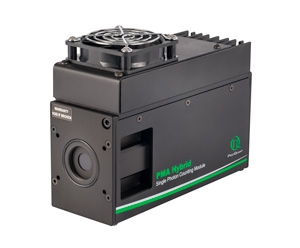
 Contact us
Contact us